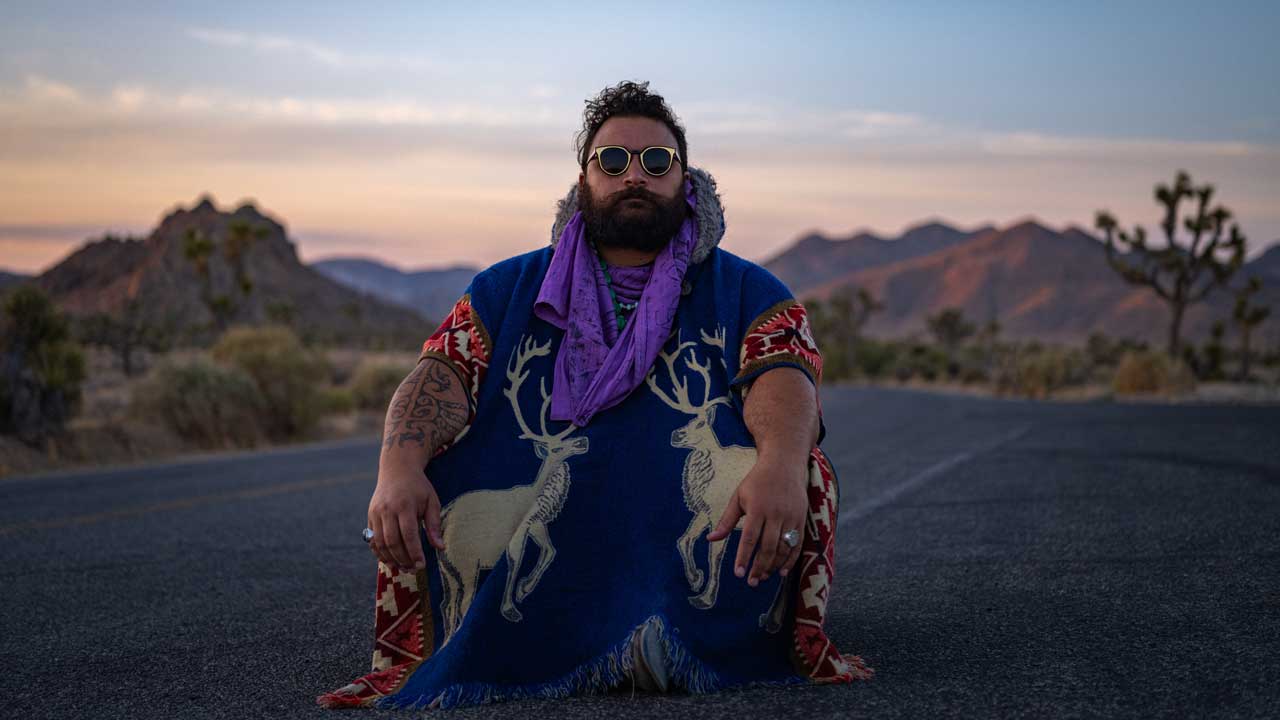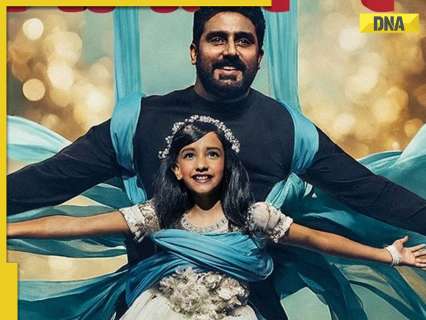"I've been changing nappies and doing washing for the last 10 years," says Troy Kingi. "That was my rock'n'roll lifestyle." Musicians don't usually have ten-year plans.
Or, if they do, they're not going to tell you about them, simply because there's so much scope for it all to go tits-up as real life gets in the way. Troy Kingi isn't like other musicians. When the then 36-year-old New Zealander launched his first full-length album in 2016, he unveiled an unlikely master plan: 10 albums (each recorded with a different band) in 10 years, in 10 different genres, followed by retirement.

Eight years on, he's still on schedule. Album number eight, was recorded at the fabled Rancho De La Luna recording studio in Joshua Tree, California. It's the home of .
It's where and friends assembled to take mushrooms and record music for three days straight for the first Desert Sessions release, It's where made their debut album. The studio has played host to a who's-who in the stoner rock scene. Eagles Of Death Metal.
Fu Manchu. Brant Bjork. Masters Of Reality.
Kyuss. Mondo Generator. An episode of Anthony Bourdain's was filmed there.
's movie paid a visit. They make their own Mezcal. You get the gist.
is, naturally enough, a desert rock album. It's also a very good desert rock album, featuring riffs that throb and pummel and a guitar tone (courtesy of studio head honcho Dave Catching) that layers fuzz upon fuzz to create a sound that's entirely in keeping with the music that inspired it. It's also unlike anything Kingi has made before.
Previous albums in the 10:10:10 series have included (psychedelic soul), (roots reggae), (80s pop) and the wonderful (singer-songwriter folk made with another Kiwi, Delaney Davidson). So how on Earth did we get here? "I came from a Māori boarding school where we only listened to R&B and hip hop, so rock and distorted guitars were so far from what I was accustomed to," says Kingi, speaking from his home in Kerikeri, 150 miles north of Auckland. "I was working part-time at McDonald's when I was at high school, and at the end of the week, when I got my paycheck, I'd go into a place called Misty's, the local music shop owned by some old dude.
It always smelled like incense." Kingi would pick out random CDs, based on recommendations from his schoolfriends or simply because he liked the cover art. And, having become a fan of Dave Grohl through his work with and , he was inspired to try out Queens Of The Stone Age's .
"It kind of scared me to begin with, like, 'Oh, this is too, too much'," says Kingi. "And then the more I sat with it, the more I loved it, and then eventually, to this day, it became my favourite album of all time." Having made album number seven, (soulful instrumentals), Kingi assembled a band to make the eighth.
Sonic expertise came in the shape of a high school friend, guitarist Ezra Simmons, best known as the drummer in NZ fuzz/psych-rock duo Earth Tongue, with rhythm provided by regular collaborators Marika Hodgson (bass) and Treye Liu (drums). And then it was off to Joshua Tree, with . Kingi wasn't ready.
"I was quite scared and anxious," he says. "The last few years, I've probably got a bit cocky, to be honest, writing the album a month leading into going into the studio, then three weeks leading into going to the studio, then two weeks, and then, on the last album, kind of writing it in the studio. This one, I was scared, because we had a documentary crew.
We had a whole team going over there, and I had three ideas for three songs. So I was like, 'Oh no, what's going to happen? Um, is my mind right? Am I?' I was questioning a lot of things." When the musicians arrived in the desert, two experiences turned things around.
First, they met with Sean Milanovich, a member of the Cahuilla Nation and Vice-President of the Native American Land Conservancy, who took the party to a sacred site deep in the Mohave desert. For Kingi, the trip was life-changing. "It made me feel really insignificant," he says.
"We went into this cave and we had this art on the wall that's thousands of years old, and then you think of our time on Earth and you realise it's just a blip in history. So it just took a big burden off my shoulders, you know? The world doesn't rely on you, right? In 50 years time, it's going to be somebody else. So just enjoy.
" The second experience was one that revived the spirit of Josh Homme's first Desert Sessions, as Kingi and drummer Treye Liu visited a sacred healing retreat run by two shamen, Danny Rojas and Jael Vera, to take part in a ceremony involving mapacho smoke (from an Amazonian tobacco used by shamen in conjunction with sacred plant medicines) and magic mushrooms. "I was a little bit concerned, because I haven't really delved into the world of drugs," says Kingi. "But at that point, we've got the documentary crew there, but I'm also on my own journey to unblock my creative block.
So I was ready to do anything and try anything that could help. So I was anxious, but I was excited at the same time." It worked.
Creativity flowed. "I ended up coming back with 17 tracks. So something obviously happened over there.
Like a mystical thing." While some of the material reflects that late burst of activity – the lyrics to mention Rancho De La Luna's official studio dog, Chunk – is a cohesive, often thrilling album. Songs like and are all powered by archetypal desert rock riffs, with overdriven fuzz and distortion dovetailing with occasionally cosmic noodling.
The real point of difference is Kingi's soulful voice, and while his notion of 'genre' seems somewhat malleable – , with its other-worldly, Santana-esque guitar, could be dropped onto most of the other albums in the series and no one would complain – the highlights are worthy additions to the Desert Rock canon. sounds almost apocalyptic, Ezra Simmons heightening the threat levels with some heartfelt screaming, while is a spooky piece of high desert psychedelia. Kingi has also contributed to Dave Catching's upcoming Rancho De La Luna tribute album, where he'll appear alongside the likes of Josh Homme, Dave Grohl, and , coupled with a launch show in Los Angeles.
Add this to the two final albums in the 10:10:10 series – the last of which will be a big band album recorded at Abbey Road ("a big band album, like James Bond theme songs sung by Al Green") – and it's possible Kingi may find an international audience for his music just as he calls it quits. And if he does, he'll leave a unique legacy. "I thought about that at the very beginning, having these 10 albums that will live on," he says.
"My whole thing was making sure that everything I put out I was proud of, and, in the same vein as Quentin Tarantino – someone finally watches his movies 10 or 20 years after they come out, and they love that movie, and then they start looking at his other ones – I want the same thing. Someone to fall in love with one of my albums 20 or 30 years down the track. And they're like, 'Oh, wow, what else has he got?' And then they jump on something, and they're like, 'What the hell? It sounds nothing like the last one.
' So, yeah, that is my legacy." . Online Editor at Louder/Classic Rock magazine since 2014.
38 years in music industry, online for 25. Also bylines for: Metal Hammer, Prog Magazine, The Word Magazine, The Guardian, The New Statesman, Saga, Music365. Former Head of Music at Xfm Radio, A&R at Fiction Records, early blogger, ex-roadie, published author.
Once appeared in a Cure video dressed as a cowboy, and thinks any situation can be improved by the introduction of cats. Favourite Serbian trumpeter: Dejan Petrović. “I don’t get into many fights now cos you get hit on the throat and you miss a gig”: The explosive rise of Lynyrd Skynyrd, America’s greatest southern rock band Watch Metallica’s Kirk Hammett and Robert Trujillo jam Ministry’s Just One Fix live onstage “I got a letter from Ozzy telling me my services weren’t needed and Axl had gotten rid of me”: How Zakk Wylde launched Black Label Society with the booze-fuelled chaos of Sonic Brew.



















